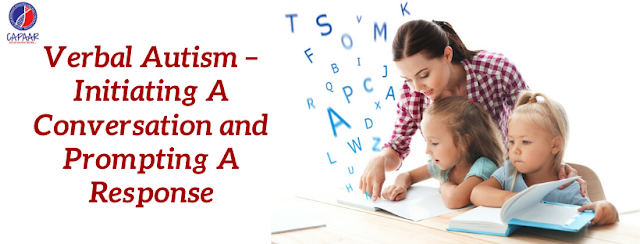Verbal Autism – Initiating A Conversation and Prompting A Response
The
disorders associated with Autism is broadly characterized as Verbal autism and Non-verbal autism.
Verbal impairment is a significant obstacle in the developmental stages of a
child. Parents and Therapists of Autistic individuals face a demanding task in
addressing this difficulty. Nevertheless, when the right strategies are
adopted, the children make promising progress in overcoming the impairment.
·
Repetitive behavior
Autistic children
often say a set of unrelated words and phrases repetitively that makes less or
no meaning. The repetitive phrases include high pitched squealing, mimicking
television programor commercials dialogues, robot-like speech style. They also
tend to make irrelevant statements in the middle of a conversation. For
example, saying “ This is my mom” to his own family.
·
Limited interests with rare and unique
abilities
While Autistic
individuals struggle with basic communication and social interaction, they
often exhibit exceptional skills. Their skills could be in the field of music,
mathematics, art, memorization. Their interests are limited to a particular
ability or skill and they often excel in the same.
·
Irregular Development
Children with Autistic
Spectrum Disorder (ASD) generally develop an abnormal level of ability when compared to
children without ASD. Owing to their exceptional abilities, sometimes these
children are able to read words at a very young age, but not perceive it. They
fail to respond when their names are called out despite having no hearing
impairment.
·
Treating Language and Speech Issues
Speech therapy is the proven successful treatment model to treat
Autistic individuals. On assessing the physical fitness and hearing ability,
Speech-language therapists treat these individuals by identifying the best way
to deal with communication disruptions and social interaction deficiency.
Speech and language skill development is of utmost importance while treating
Autism.
·
Build a voluntary and functional
communication
The priority of Speech
therapy is to establish and develop voluntary and functional
communication among Autistic individuals. This will ensure that these children
are able to convey their basic wants and needs required for their day to day
life. The other aim of the Speech therapists is to help these individuals to
appropriately respond to questions and limit the use of unrelated, repetitive
statements. Furthermore, to help them create own sentence and speak more independently,
therapists gradually reduce the use of prompts (fading prompts).
Autistic
individuals often appear to be rude and uninterested. Therapists make it a
point to teach the child basic etiquettes such as saying “Thank you”, “ Sorry”
and “Please”. This will encourage the child to participate in social
interactions.
As
the child gradually exhibits signs of improvement in verbal behavior, the
approach of the speech therapists are channeled towards dealing with other
issues that are characteristic of Autistic
children. The areas that need further attention are
·
Language and sound flaws
·
Inability to answer sensibly to questions
·
Struggle with decoding the non-verbal language
Parents,
educators, and caregivers of the children must participate in engaging in
conversation and related activities. Communication and activities should be
structured to the interests of the child.
Regular and specialized treatment will support the child in overcoming
the communication obstacles and encourage them to stir an unprompted social
interaction.





Comments
Post a Comment